Let’s not lie—some of us are still more excited to watch an old Nollywood movie from the 90s than the latest Netflix original. The audio may be off, the camera may shake, and the video might have “Part 1 of 4” in big fonts—but we love it!
Even in 2025, people are still watching, quoting, and celebrating the magic of old Nollywood. Yoruba, Hausa, Igbo, and English-language classics each had their own unique flavor—but one thing they all had in common? They stuck with us.
Here’s why these movies still have a cult following:
1. Relatable Stories That Spoke to Us All
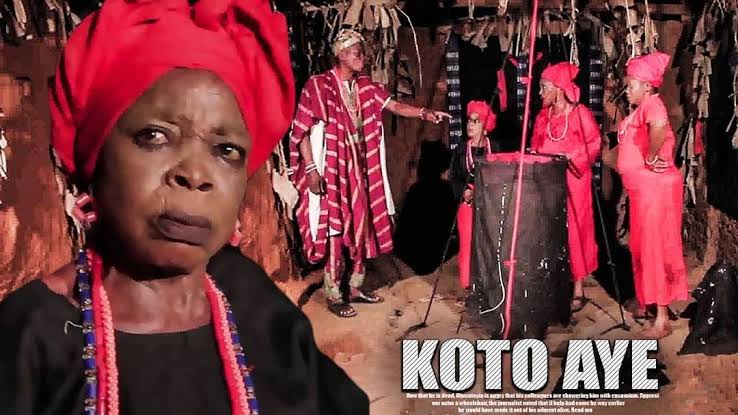 Back then, Nollywood movies weren’t trying to be flashy or fancy—they were just telling our stories. You’d watch a film like Living in Bondage, Turmin Danya, The Draw, Koto Aiye or Glamour Girls and feel like someone understood your community, your fears, and your dreams.
Back then, Nollywood movies weren’t trying to be flashy or fancy—they were just telling our stories. You’d watch a film like Living in Bondage, Turmin Danya, The Draw, Koto Aiye or Glamour Girls and feel like someone understood your community, your fears, and your dreams.
Igbo classics like Living in Bondage, Nneka the Pretty Serpent, and Oracle gave us deep stories about greed, consequences, and the spiritual side of life. Yoruba films like Ti Oluwa Ni Ile, Saworoide, and Koto Orun brought culture, tradition, and moral values to the screen with powerful proverbs and bold characters. And of course, the English films like Domitilla, Diamond Ring, and Blood Money gave us drama for days!
2. Legendary Actors That Carried Every Scene
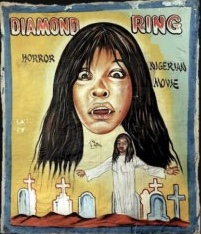 When you think of old Nollywood, some faces instantly come to mind. In Igbo-centered films, we had stars like Kenneth Okonkwo, Ngozi Ezeonu, Chiwetalu Agu, and Eucharia Anunobi giving unforgettable performances. Yoruba legends like Taiwo Hassan (Ogogo), Oga. Bello, Yinka Quadri, Fausat Balogun (Madam Saje), Mama Rainbow, Iya Gbonkan, and Baba Suwe made us laugh, cry, and fear witches—all in one movie.
When you think of old Nollywood, some faces instantly come to mind. In Igbo-centered films, we had stars like Kenneth Okonkwo, Ngozi Ezeonu, Chiwetalu Agu, and Eucharia Anunobi giving unforgettable performances. Yoruba legends like Taiwo Hassan (Ogogo), Oga. Bello, Yinka Quadri, Fausat Balogun (Madam Saje), Mama Rainbow, Iya Gbonkan, and Baba Suwe made us laugh, cry, and fear witches—all in one movie.
And let’s not forget the English-language stars who blended across cultures: Pete Edochie, Liz Benson, Saint Obi, Ramsey Nouah, and Kanayo O. Kanayo of course, arguably the king of sacrificial roles.
3. Cultural and Spiritual Realness
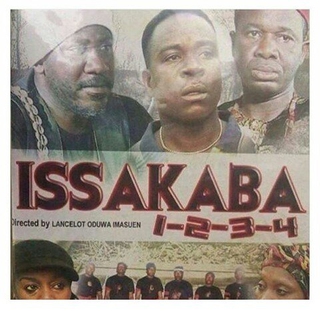 Old Nollywood movies, especially Yoruba and Igbo ones, never shied away from spirituality. If you watched Karashika, End of the Wicked, or Billionaire Club, you probably slept with the light on out of fear that gripped you from how real the scenes felt. These movies made us question every “wealthy uncle” and look suspiciously at anyone holding a black nylon bag.
Old Nollywood movies, especially Yoruba and Igbo ones, never shied away from spirituality. If you watched Karashika, End of the Wicked, or Billionaire Club, you probably slept with the light on out of fear that gripped you from how real the scenes felt. These movies made us question every “wealthy uncle” and look suspiciously at anyone holding a black nylon bag.
Yoruba films like Ajani Ogun, Koto Aiye, and Aje Ni Iya Mi were loaded with traditional beliefs and lessons. You’d hear prayers, chants, and chants in deep Yoruba, with scenes of village meetings and spiritual warfare. Same with Igbo films like Issakaba, Evil Forest, and Igodo—action-packed with heavy cultural undertones.
4. Language, Proverbs, Costume and Village Vibe
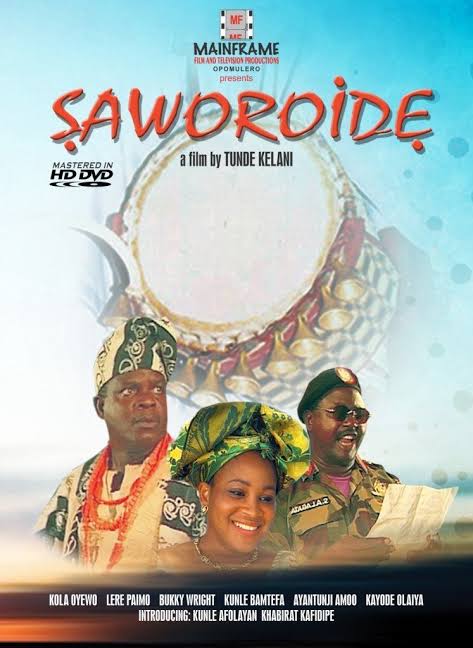 From oversized suits and strong shoulder pads to village chiefs with twenty beads on their necks—fashion in old Nollywood was a show on its own. Yoruba movies especially had characters dressed in full traditional outfits from head to toe, even in the bush!
From oversized suits and strong shoulder pads to village chiefs with twenty beads on their necks—fashion in old Nollywood was a show on its own. Yoruba movies especially had characters dressed in full traditional outfits from head to toe, even in the bush!
You can’t talk about 90s Nollywood without mentioning the language! These films were proudly rooted in their culture.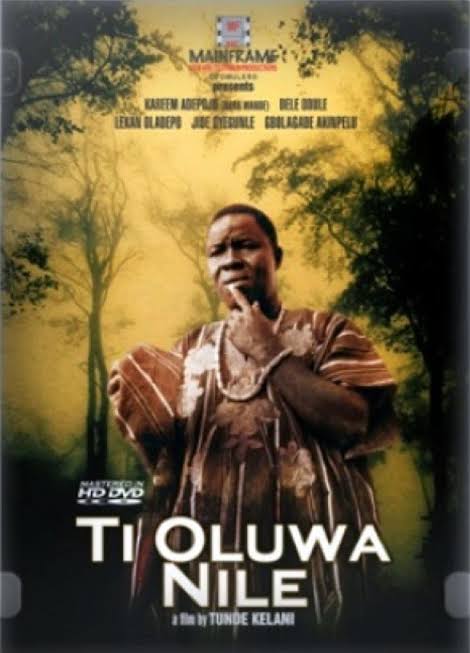
In Yoruba movies, proverbs ruled every conversation. You hear proverbs like, “Ti ewe ba pe lara ose a dose” (If a leaf is bonded with soap for long, it will become soap).
Igbo films also came with deep Igbo dialogues, spiritual incantations, and wise sayings. Imagine Pete Edochie in his rich voice saying “Onye wetere mmanụ, ya bialu k’ojuo ya n’ala.” (Let the one who brought palm oil rub it on the ground).
And even the English-speaking films were soaked in Nigerian pidgin and local expressions, making it feel like home, no matter where you were watching from.
5. Community Watching: The Golden Era of Home Videos
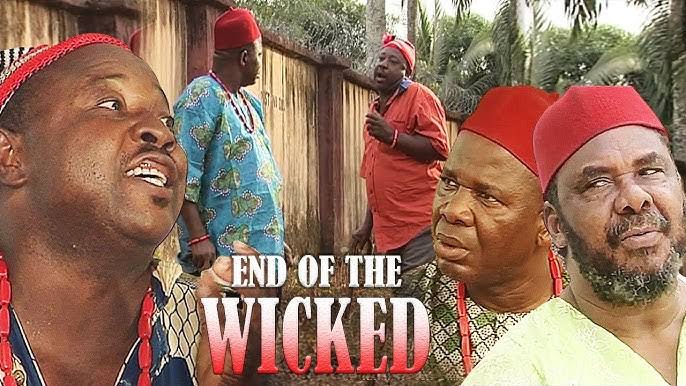 Watching these movies wasn’t just about the content—it was about the experience. Recall renting a movie from the video club, when the video club says that particular tape has been rented out, or asking your neighbor for Part 2, rewinding tapes with your hand when the VCR chewed it… nostalgic, right?. It was all part of the fun.
Watching these movies wasn’t just about the content—it was about the experience. Recall renting a movie from the video club, when the video club says that particular tape has been rented out, or asking your neighbor for Part 2, rewinding tapes with your hand when the VCR chewed it… nostalgic, right?. It was all part of the fun.
Whether you were Igbo, Yoruba, Hausa, or from anywhere else in Nigeria, those family movie nights bonded us. Everyone in the house had an opinion during the movie—“This woman too like money!” or “That juju go catch him last last!”. What of the “To God be the glory” ending almost every single movie had? It was fun to predict that was the end.
6. They Represented Us
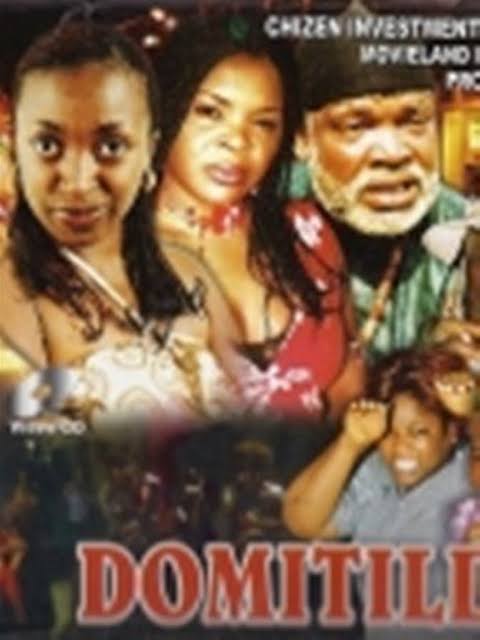 Before the world paid attention to Nollywood, we already had it good. These movies reflected us—our beliefs, our struggles, our joys, our superstitions. Whether it was the village girl who made it big in the city or the corrupt chief who paid dearly, these were our stories.
Before the world paid attention to Nollywood, we already had it good. These movies reflected us—our beliefs, our struggles, our joys, our superstitions. Whether it was the village girl who made it big in the city or the corrupt chief who paid dearly, these were our stories.
The Igbo films showed ancestral pride and wealth gone wrong. Yoruba films highlighted tradition, respect, and community. English-language dramas tackled modern life, relationships, and ambition. Together, they gave us a full picture of who we are.
On a final note, 90s and early 2000s gave us the soul of Nollywood. Yes, the sound sometimes echoed like a church hall, and yes, the visual effects were “creative”. But the heart? 100%. These films were raw, bold, and unforgettable.
So when someone says they’d rather watch Ti Oluwa Ni Ile, Igodo, Ori, Diamond Ring or Living in Bondage again instead of the latest cinema blockbuster, it’s not just nostalgia—it’s because those movies made us feel something.
They made us think, laugh, pray, fear, and most importantly, remember who we are.
“To God Be the Glory”













Leave a comment